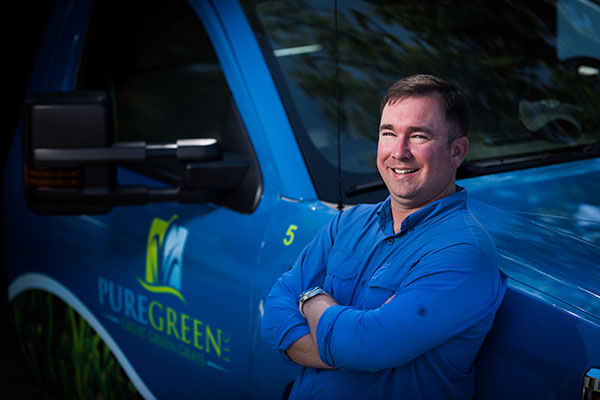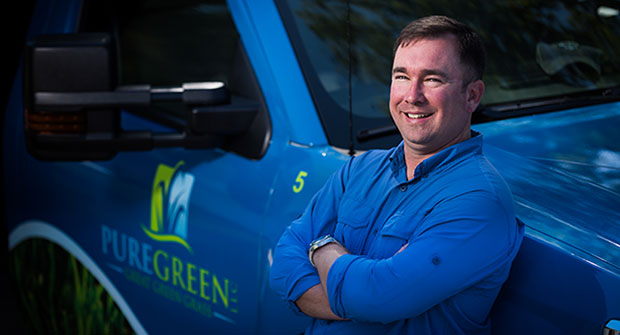
When asked for advice on how to succeed in the green industry, Nathan Brandon often thinks of one of his favorite quotes.
“Never sacrifice the permanent on the altar of the immediate,” says the owner of Pure Green in Nashville, Tenn. “Meaning, don’t do something now for immediate gratification to the detriment of where you want to go.”
These words of wisdom have guided Brandon’s green industry career, which began at age 12 when he started mowing his neighbors’ lawns for $45 per cut. In fact, he still remembers which home belongs to his very first client.
“I got into it for the sense of obligation to have my own money and not have to ask for it (from my parents). As far as why I stayed in the industry for this long, I guess I’m a glutton for punishment,” he says with a laugh. “But it’s been a good industry. It’s provided a good living for me and my family and gives me the flexibility to do the things I want to do.”
Brandon and a business partner started a full-service landscape company called Turf Managers in 2000. After more than 10 years in business, Brandon says he and his partner began to have different visions of what the company should be. Brandon wanted to start shedding the types of services that require time-consuming consultative selling, such as maintenance and installations, and instead focus more on lawn care, which he says is quicker and easier to sell online or over the phone. About four years ago, Brandon made the difficult decision to sell his portion of Turf Managers to his partner and started Pure Green.
Today, Pure Green is a $1.3-million company that provides lawn care services to an 85 percent residential, 15 percent commercial clientele. Pure Green has seven employees, with an eighth set to join the team in early 2018.
“It came down to where we were as business owners and how we saw the growth and development of the business,” Brandon says. “Our two paths were diverging and were not coming together.”
Brandon decided to build Pure Green’s lawn care program using Holganix, an organic, plant-based product that incorporates soil microbes, microbe food and nutrient enhancers to build resilient plants and healthier soils. This approach reduces his use of synthetic products by 50 to 80 percent, he estimates. Brandon markets Pure Green as an organic-hybrid company and says it’s a designation his customers appreciate.
“I started doing research and reading about and understanding soil biology,” he says. “The organic products make the synthetic products work better. When you’re using organics, you are taking care of the soil and, in turn, you are taking care of the turf.”
After starting Pure Green, Brandon’s initial goal was to reach $10 million in 10 years. He has since shifted that goal to $5 million in 10 years after realizing he was undercapitalized to get where he wanted to go in that time frame. Part of his growth strategy is through the acquisition of other lawn care companies. Two years ago, Brandon stumbled upon an opportunity to acquire a local lawn care company that was a “virtual perfect fit” for Pure Green. The company’s customer population increased his route density by about 35 percent, and he has retained 80 percent of its clientele.
“I went to talk to (the business owner) about a truck he had for sale and told him that if he ever thought about selling his business to give me a call. Within 30 minutes, he sent me an email,” Brandon says, adding that it took about nine months to secure the deal. “I wasn’t planning on doing an acquisition until year three, but that one came in year two, and it was too good to pass up.”
Brandon is currently working toward a second acquisition. He says any potential deals have to make sense both logistically and financially for him to consider them. He passed on an acquisition opportunity in 2017 because the customer base didn’t align with his routes.
“It didn’t make financial sense to pay good money and have my customer base spread out even further—I would rather just focus on marketing and sales,” he says. “It’s all about density—the more customers you have clustered together, the more money you can make.”
R&D
One challenge Brandon has faced as his company has grown is implementing the systems and processes necessary to keep things running smoothly. He acknowledges that he doesn’t have a background—or an interest—in this aspect of running a business. He employs a process he calls R&D, or “rip off and duplicate”—he tries to mimic what other business owners have done. He has gotten invaluable guidance and feedback through his membership in the Entrepreneurs’ Organization (EO), a network of business owners who are happy to share how their businesses operate. EO’s Nashville chapter has more than 200 members, and Brandon has been an active participant for 14 years. He also uses a consultant, paid on a monthly retainer, to help with this aspect of the business.
“It’s something that I’ve struggled with personally because I don’t have a background in it. It takes me a lot of time and effort, and I don’t enjoy it,” Brandon says. “What is the process when you get into the office? What is the process of loading up your truck every day? All of those things have to be consistent.”
Like many LCOs, Brandon says labor is a challenge for him, and he is always looking for quality technicians to add to his team. He finds his crew members “all over the place”—he has recruited them from competitors and from sister industries like pest control. He also runs ads on sites like Craigslist. Brandon makes it a priority to always have at least one or two potential workers in mind to avoid being placed in a predicament should someone leave the company during the busy season.
“I am constantly recruiting and looking for people,” he says. “I have found that if I don’t have one or two people in the hopper, it never goes well. You get rushed, and you end up making less-than-ideal hiring decisions.”
While Pure Green’s future looks bright, Brandon isn’t sure he wants to stay in the green industry indefinitely. He doesn’t know exactly what he would do if he wasn’t running Pure Green, but he believes it would have something to do with helping other young entrepreneurs grow their businesses. Through EO, Brandon acts as a mentor and leads classes and forums to help startup companies get up and running—work he finds very rewarding. But for now, Brandon will continue to make the best decisions for his company and where he wants it to go in the future.
“I have a lot of customers asking for full-service work, but that’s just not my business anymore. If I did that, I would be taking away time and resources from my true business,” Brandon says. “There were a lot of things we used to do so we could make a dollar now—young businesses tend to just see the dollar signs. But it makes you lose direction of where you want to go.”
Photo: Pure Green


